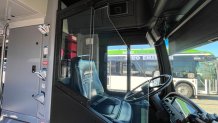The Biden-Harris Administration announced nationwide action Wednesday to protect frontline transit workers, calling assaults on bus drivers and other transit employees “a national-level hazard.”
The Federal Transit Administration (FTA) announcement begins a 60-day window in which stakeholders are able to comment as the agency prepares for further steps to combat a concerning rise in assaults on transit workers. Attacks increased by 121% between 2008 and 2021, according to the FTA.
An NBC Bay Area Investigative Unit report released last week found Oakland-based AC Transit is on pace in 2023 to have the highest rate of assaults on transit workers out of any major transit system nationwide, according to federal data. AC Transit didn't agree to an interview about its current assault rate but said it's still reviewing its 2023 numbers. The agency also said it has had a broader definition of assaults.
Bay Area-wide, our team's four-month review of bus surveillance video revealed drivers being hit, shot at even kidnapped by unruly passengers since the pandemic.
If the FTA moves forward with the plans outlined in Wednesday's announcement, transportation agencies would be required to do the following:
- Conduct a safety risk assessment on assaults on their transit workers
- Identify action plans and strategies to reduce the attacks
- Provide data to the FTA on safety assessment, mitigation and monitoring
The announcement comes as the FTA collaborated with industry groups and union representatives to draft new safety measures that were authorized by the Infrastructure Investment and Jobs Act of 2021.
“It’s huge. It’s finally complying with the law that we’re happy to see that was put in place — the infrastructure bill,” said John Costa, president of the International Amalgamated Transit Union (ATU). “I applaud the administration for this first step, but we still have a ways to go.”
NBC Bay Area contacted two industry groups, American Public Transit Association and California Transit Association, for comment but did not receive responses.
Get a weekly recap of the latest San Francisco Bay Area housing news. Sign up for NBC Bay Area’s Housing Deconstructed newsletter.
The ATU is pushing for further federal action that would require fully-enclosed “cockpit-style” bus driver barriers to be implemented on buses across the country.
“My top priority is to redesign the bus,” said Costa.
In New York, MTA is testing a new prototype that extends the physical barrier to the interior roof of the bus and includes additional larger glass on the operator’s compartment door and a fixed glass in front of the door.
Locally, AC Transit said its custom-engineered protective barriers program cost $2.4 million, but the project has fallen behind because of pandemic-related supply chain issues and revenue losses over the past three years. AC Transit said it has retrofitted 190 buses and still has 440 coaches remaining as of December 22. AC Transit shared pictures of one of the new barriers on December 22.

Regarding the assaults, AC Transit spokesperson Robert Lyles said “...one act of violence is too many, and AC Transit will exhaust all means to identify those responsible and fully prosecute.”
The agency added, since 2019, it has been “dedicated to bolstering the safety of frontline workers through the installation of protective systems. [AC Transit] started by launching tests of two custom-engineered Bus Operator Protective Barriers districtwide. Following a vote by operators to determine their preference, protective barriers are now actively deployed at all bus divisions.”
Watch the Investigative Unit’s report on recent bus driver attacks on the rise.
Catch up on our team's original reporting on AC Transit bus driver attacks in 2018.
Candice Nguyen was the investigative reporter on this story. To contact her about this issue or another email her at candice.nguyen@nbcuni.com.


